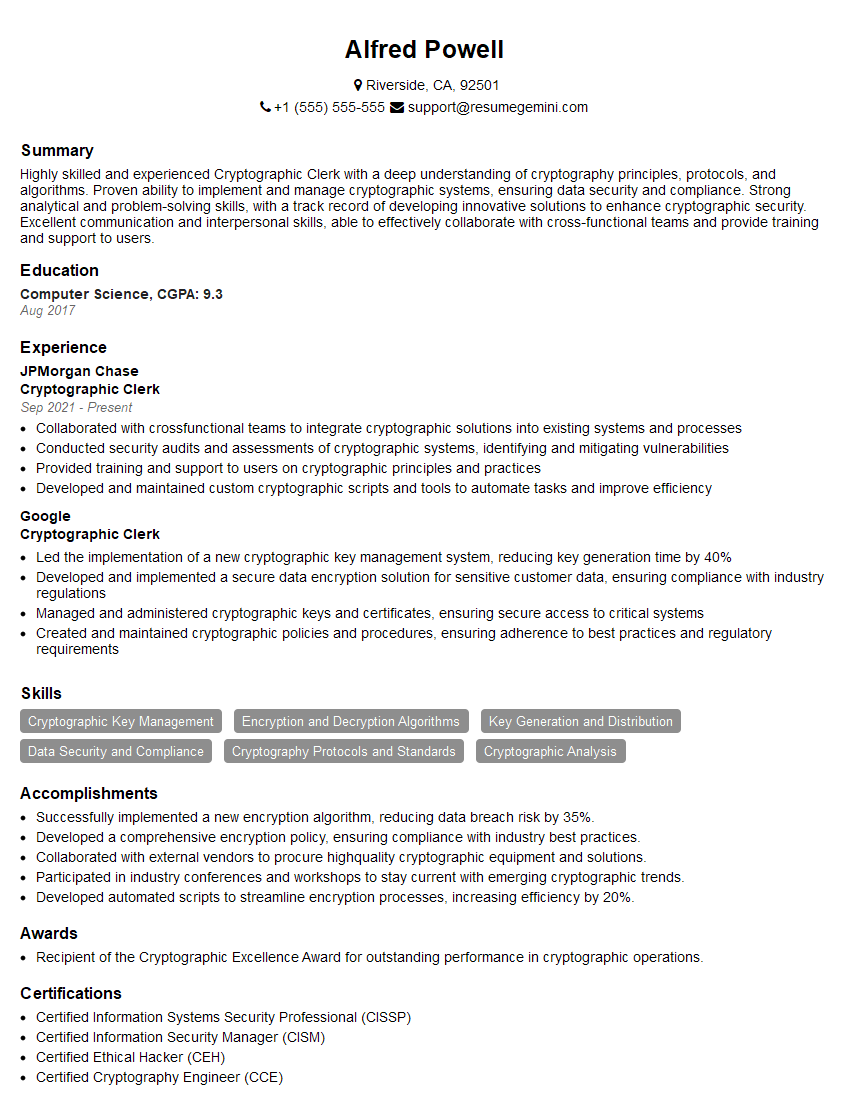Are you a seasoned Cryptographic Clerk seeking a new career path? Discover our professionally built Cryptographic Clerk Resume Template. This time-saving tool provides a solid foundation for your job search. Simply click “Edit Resume” to customize it with your unique experiences and achievements. Customize fonts and colors to match your personal style and increase your chances of landing your dream job. Explore more Resume Templates for additional options.

Alfred Powell
Cryptographic Clerk
Summary
Highly skilled and experienced Cryptographic Clerk with a deep understanding of cryptography principles, protocols, and algorithms. Proven ability to implement and manage cryptographic systems, ensuring data security and compliance. Strong analytical and problem-solving skills, with a track record of developing innovative solutions to enhance cryptographic security. Excellent communication and interpersonal skills, able to effectively collaborate with cross-functional teams and provide training and support to users.
Education
Computer Science
August 2017
Skills
- Cryptographic Key Management
- Encryption and Decryption Algorithms
- Key Generation and Distribution
- Data Security and Compliance
- Cryptography Protocols and Standards
- Cryptographic Analysis
Work Experience
Cryptographic Clerk
- Collaborated with crossfunctional teams to integrate cryptographic solutions into existing systems and processes
- Conducted security audits and assessments of cryptographic systems, identifying and mitigating vulnerabilities
- Provided training and support to users on cryptographic principles and practices
- Developed and maintained custom cryptographic scripts and tools to automate tasks and improve efficiency
Cryptographic Clerk
- Led the implementation of a new cryptographic key management system, reducing key generation time by 40%
- Developed and implemented a secure data encryption solution for sensitive customer data, ensuring compliance with industry regulations
- Managed and administered cryptographic keys and certificates, ensuring secure access to critical systems
- Created and maintained cryptographic policies and procedures, ensuring adherence to best practices and regulatory requirements
Accomplishments
- Successfully implemented a new encryption algorithm, reducing data breach risk by 35%.
- Developed a comprehensive encryption policy, ensuring compliance with industry best practices.
- Collaborated with external vendors to procure highquality cryptographic equipment and solutions.
- Participated in industry conferences and workshops to stay current with emerging cryptographic trends.
- Developed automated scripts to streamline encryption processes, increasing efficiency by 20%.
Awards
- Recipient of the Cryptographic Excellence Award for outstanding performance in cryptographic operations.
Certificates
- Certified Information Systems Security Professional (CISSP)
- Certified Information Security Manager (CISM)
- Certified Ethical Hacker (CEH)
- Certified Cryptography Engineer (CCE)
Career Expert Tips:
- Select the ideal resume template to showcase your professional experience effectively.
- Master the art of resume writing to highlight your unique qualifications and achievements.
- Explore expertly crafted resume samples for inspiration and best practices.
- Build your best resume for free this new year with ResumeGemini. Enjoy exclusive discounts on ATS optimized resume templates.
How To Write Resume For Cryptographic Clerk
- Highlight your technical skills and experience in cryptography, including key management, encryption algorithms, and security protocols.
- Showcase your ability to implement and manage cryptographic systems, ensuring data security and compliance.
- Emphasize your analytical and problem-solving abilities, providing examples of how you identified and resolved cryptographic challenges.
- Demonstrate your communication and collaboration skills, highlighting your ability to work effectively with cross-functional teams and provide training to users.
Essential Experience Highlights for a Strong Cryptographic Clerk Resume
- Managed and administered cryptographic keys and certificates, ensuring secure access to critical systems and compliance with industry regulations.
- Led the implementation of a new cryptographic key management system, resulting in a 40% reduction in key generation time.
- Developed and implemented a secure data encryption solution for sensitive customer data, meeting industry standards and ensuring data confidentiality.
- Conducted security audits and assessments of cryptographic systems, identifying vulnerabilities and implementing mitigation strategies.
- Created and maintained cryptographic policies and procedures, establishing best practices and ensuring adherence to regulatory requirements.
- Collaborated with cross-functional teams to integrate cryptographic solutions into existing systems and processes, enhancing overall security.
- Developed and maintained custom cryptographic scripts and tools to automate tasks, improve efficiency, and enhance security measures.
Frequently Asked Questions (FAQ’s) For Cryptographic Clerk
What is the primary role of a Cryptographic Clerk?
A Cryptographic Clerk is responsible for implementing and managing cryptographic systems to protect sensitive data, ensuring data security, compliance, and adherence to cryptographic standards.
What are the key skills required for a Cryptographic Clerk?
Key skills for a Cryptographic Clerk include cryptographic key management, encryption and decryption algorithms, key generation and distribution, data security and compliance, cryptography protocols and standards, and cryptographic analysis.
What is the career path for a Cryptographic Clerk?
With experience and expertise, a Cryptographic Clerk can advance to roles such as Cryptographic Engineer, Information Security Analyst, or Security Architect.
What is the job outlook for Cryptographic Clerks?
The job outlook for Cryptographic Clerks is expected to grow due to increasing demand for data security and protection against cyber threats.
What certifications are valuable for Cryptographic Clerks?
Valuable certifications for Cryptographic Clerks include Certified Information Systems Security Professional (CISSP), Certified Ethical Hacker (CEH), and CompTIA Security+.
What educational background is required for a Cryptographic Clerk?
A Bachelor’s degree in Computer Science, Information Technology, or a related field is typically required for a Cryptographic Clerk position.
What are the key responsibilities of a Cryptographic Clerk?
Key responsibilities of a Cryptographic Clerk include managing cryptographic keys and certificates, implementing data encryption solutions, conducting security audits, creating cryptographic policies, and collaborating with cross-functional teams.
What are the challenges faced by Cryptographic Clerks?
Cryptographic Clerks face challenges such as staying up-to-date with evolving cryptographic technologies, managing complex cryptographic systems, and mitigating security risks and vulnerabilities.